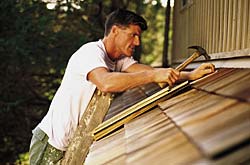Galvanized Gutters Refuse the Rust
See if We Have Top-Rated
Roofing Contractors in Your Area

All gutter systems are the same, right? Well, they all serve the same purpose: to collect, channel, and redirect moisture from your roof, siding, and foundation. Therefore, they're all pretty important when it comes to maintaining and protecting your home. However, since they're constantly surrounded by the elements, the troughs themselves also need some protection. You'll definitely want to keep them free of debris, so every fall and spring you may have to get the ladder out and go into the trenches. If clogged, they serve no actual function and could even increase the danger to your home. Gutter-guards are another way to prevent obstruction but even then these are exposed to water at all times. So a great way to preserve your drainage system is to invest in galvanized gutters.
What Are Galvanized Gutters?
Since they're constantly collecting water in their troughs, guttering systems can be especially vulnerable to water damage, most often in the form of rust. Particularly if you live in the Pacific Northwest or Midwest, areas known for their extreme precipitation, aluminum or steel drainage systems can become impaired within just a few years of installation. Therefore, it's wise to invest in galvanized metals. Galvanized gutters are coated in a thin layer of zinc to help resist the rust. This material can also be primed and then painted over to help increase its chances for protection against the elements.
Why Are They Better?
Wooden gutters can crack, rot, and are more expensive to install since they require special skills and techniques. Aluminum and steel are stronger, but they can still rust and tend to be thin. This makes them more pliable but also bendable, so when ladders or debris land on them they can easily twist and could possibly break. Galvanized gutters are sturdier and won't crack under the pressure of wind gusts, falling branches, or collected yard waste, such as leaves, twigs, and mud. Also, for fashion's sake, they can still be painted any color in order to match the exterior of your home's siding.
Do They Need TLC?
They're tough and resistant, but they will require occasional maintenance. The most common concern is paint problems. Since they're already coated, sometimes the paint can flake off within a few years. A great way to extend its longevity is to invest in a galvanized metal primer before painting on the finishing coat. Also, there are several other coating protectants out there, so you may want to seek some professional painters for proper advice and procedures. But even when all the precautions are taken, they may still flake within a decade, so make sure to inspect them every time you clean. That's right, just because they refuse rust doesn't mean they automatically clean themselves, and if the rubble and refuse isn't removed often, the lifespan of the system will be shortened as well, allowing rust to eventually occur (especially at the seams and corners).
Need a better drainage system? Use this link to
Install Gutters
What about Installation?
It's always wise to hire a service professional for installation. They know how to properly connect the pieces and solder them together to avoid leakage. Plus, they'll even use galvanized parts (screws, brackets, etc.) in order to ensure all-around protection. However, when you contact these experts, you'll want to be able to inform them of your specific needs. Do you want the standard size (5" is most common) or oversized troughs? Square edge or half-round? Regular or decorative detail? What color does it need to be?
These contractors usually charge by the hour, which means the cost will depend on several factors: size of the house, number of stories or levels, and the degree of difficulty in getting to the roof. So keeping in mind the perimeter and size of the project will give you an idea of the price. Also, after installation, if you run into problems (sagging, leaking, holes, rotting, disconnections, breakage), you'll want to call upon the same professionals for repair (they may even offer a warranty since these sturdy, specially-coated products usually remain problem-free).

